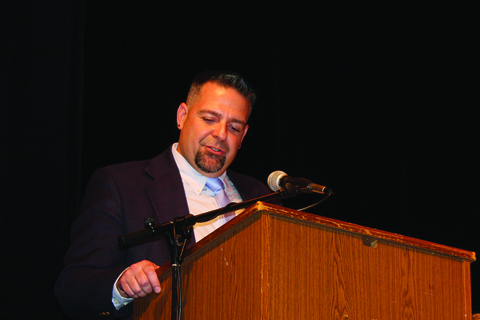By Brittany Wilson, The Whetstone

On June 30, Pastor Scot McClymont will no longer be welcome to serve as chaplain on Wesley College’s campus—not because he has done anything wrong, but because “God’s plan†for McClymont’s life conflicts with President Clark’s plan for the college.
McClymont said he will not go without a fight.
“All they had to do was say, ‘You’re done at the end of the year, we no longer need your services’—I have no problem with that,†he said. “I would have even had more respect for them if they just said, ‘You’re fired.’ But that’s not what they said. They said because I am not United Methodist I am losing my job.â€
After a year of friction with the United Methodist Conference (UMC), McClymont decided to voluntarily withdrawal from the United Methodist denomination to begin his own non-denominational church elsewhere. The next day, McClymont was told he was no longer “qualified†to be the Wesley College chaplain.
McClymont said he received an email from Peggy Johnson, the bishop of UMC, which said that she and President Clark expected his resignation from the chaplaincy at Wesley.
“I refused to sign anything,†he said. “I’m trying to fight this because it is discrimination. This is religious discrimination.â€
Clark said McClymont was not asked to resign, but that McClymont’s decision to leave the United Methodist denomination was the same as making a decision to leave Wesley College.
Clark said he wanted a full-time Methodist campus minister.
“I had discussed this vision with Pastor McClymont, and thought he would be a good fit if he were willing to take on a full-time Methodist Ministry,†he said. “I had the approval of the leadership of the Peninsula-Delaware Conference to move forward with my vision and they agreed to assign Pastor McClymont if he agreed to be our full time Methodist Campus Minister – which Pastor McClymont did not.â€
McClymont said Clark never mentioned that the full-time chaplain was expected to be a Methodist pastor.
“I told him in January I was most likely separating from the United Methodist Church,†he said. “I was not aware until March after my separation from the denomination and his conversations with the conference that he was looking for somebody who was specifically United Methodist for the position.â€
In an email to McClymont, Wesley’s Human Resources Generalist LaVette Whaley said Title VII of the Civil Rights Act states that, “subject to certain exceptions, religion may not be the basis for employment decisions.â€
However, she also said an exception can be made “when religion is a bona fide occupational qualification reasonably necessary to the normal operation of that particular enterprise.â€
Whaley said this shows that the College “may require that the position of Chaplain be held by a Methodist pastor.â€
McClymont said his personal affiliation with the UMC is not “reasonably necessary to the normal operation†of Wesley College.
“If I am not a United Methodist, will this school continue to be a school?†he said. “Of course.â€
Whaley said the college has only employed United Methodists as chaplain.
However, former Wesley College Director of Spiritual Life and Community Engagement Erica Brown said she was not a United Methodist, but a minister in the Christian Church (of the Disciples of Christ denomination). Still, she was employed to fulfill the role of campus chaplain from 2010-2012.
“I was upfront concerning my denominational affiliation when I applied for the position, and I was hired without reservation, as far as I could tell,†she said. “Regardless of my official title, I was called ‘Chaplain.’â€
McClymont said Clark’s vision to make Wesley “more Methodist†doesn’t make sense.
“Wesley is only Methodist-related,†he said. “Our student population tells a different story—7 percent of the student body is United Methodist and 93 percent is not. Why should the chaplain have to be United Methodist? Our president doesn’t even have to be United Methodist.â€
Clark said McClymont was appointed to Wesley College by the Conference leadership, which was responsible for his removal from the position.
McClymont’s job description, however, lists Clark (“President of the Collegeâ€) as his boss. The job descriptions for both the full-time and part-time chaplain positions make no mention of the United Methodist Conference or the bishop. It also does not specify that the Wesley chaplain must be Methodist.
“I was hired here—I went through the HR department, I get a Wesley paycheck, Wesley pays into my retirement,†McClymont said. “There is no paperwork, no contract that says that I am under appointment here by the conference.â€
In an email to McClymont, Amanda Allen, program administrator from the General Board of Higher Education & Ministry said, “While we absolutely hope to see a vibrant collegiate ministry and chaplaincy program on our campuses, the Guidelines do not require that the chaplain be United Methodist.â€
Vice President of Academic Affairs Dr. Jeffrey Gibson said that although Wesley is not limited to hiring only Methodist chaplains, that does not mean they cannot be preferred.
“I think in an effort to strengthen our relationship with the church, it makes sense to try to work through them first,†he said. “I think the main thing is, ‘How do we find the right chaplain for our students and for Wesley College?’ That is the primary goal.â€
Wesley junior Sam Frain, who is involved in McClymont’s ministry on campus, said he will stay in contact with McClymont, even after he is no longer chaplain.
“It makes sense why he can’t be chaplain but I think they should have let him stay,†he said. “I think he did a good job and he definitely tried to be involved— it was a blessing to have him at Wesley.â€
Clark said the college will be working closely with UMC leadership to find McClymont’s replacement, who will either be assigned by the UMC, or “more likely through a search we will conduct in consultation with the [UMC].â€
McClymont said that although he will not resign, he will have no choice but to leave the position in June.
“Basically they can get away with it and do whatever they want because this is a (private) entity—it goes by the president’s vision,†he said. “The president wants to make the school’s ties with the United Methodist church stronger, and I feel that he really wants to turn this back around to be not only a United Methodist-related school but a United Methodist school.â€
McClymont said although he is sad to leave Wesley, he is excited about the future.
“I want to be in front of people, build relationships with people, get to know people, walk with people in their journeys,†he said.
On Sept. 18, McClymont will be launching a church of his own in Smyrna, 4 the World Ministries—a name inspired by the Eric Liddell quote, “Christ for the world, for the world needs Christ.â€
“It’s really about serving the community and serving others,†he said. “We want to lift people up and empower them to make positive change within the community and around the world.â€
McClymont said although this year has been difficult, it has strengthened his faith.
“The world doesn’t cater to us,†he said. “But it’s OK because God has a plan. Sometimes you get frustrated. There were times that I got mad and I was like, ‘I can’t believe this is happening. What are you doing God?’ And He was just like, ‘Hey Scot, I’ve got this. When are you going to learn?’â€



